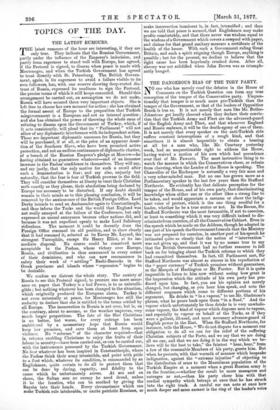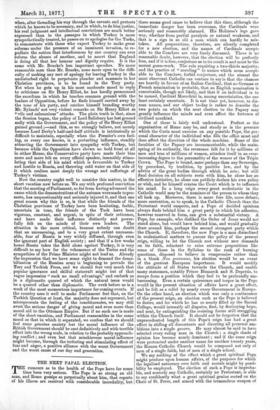THE DANGEROUS BIAS OF THE TORY PARTY.
NO one who has merely read the debates in the House of Commons on the Turkish Question can form any true- conception of the temper of the Conservative party. Unques- tionably that temper is as much more pro-Turkish than the temper of the Government, as that of the leaders of Opposition Bench is less so. It is not merely that men like Mr. Butler- Johnstone get loudly cheered when they declare their convic- tion that the Turkish Army and Fleet are the advanced-guard of the English Army and Fleet, and that whenever England. and Russia embrace, it will be the death-agony of one of them: It is not merely that every speaker on the anti-Turkish side suffers constant interruptions of a rough kind, and that sometimes it is almost impossible to obtain a hearing, at all for a man who, like Mr. Courtney yesterday week, had an unquestionable right to address the House, having waived a motion of his own which had precedence over that of Mr. Fawcett. The most instructive thing is to. watch the manner in which the Conservatives cheer, or refrain from cheering, when the Leader of the House is speaking. The. Chancellor of the Exchequer is naturally a very fair man and a very sober-minded man. But no one has grown more as a Parliamentary speaker in the last few years than Sir Stafford Northcote. He evidently has that delicate perception for the temper of the House, and of his own party, that discriminating knowledge when either one or the other likes a strong line to be taken, and would appreciate a sarcasm or cheer the indig- nant voice of protest, which is the one thing needful for a leader, whether he be a true orator or not. In the Recess, Sir Stafford Northcote was the most favourable, if not to coercion, at least to something which it was very difficult indeed to dis- criminate from coercion, of all the Conservative Cabinet. Even in the speech which he made on the Address, though he adopted in one part of his speech the Government formula that the Ministry was not prepared for coercion, in another part of his speech he intimated quite as clearly that the notion of " intervention " was not given up, and that it was by no means true to say that the British Government had no further resource to fall back on for bringing about the Turkish reforms to which they had committed themselves. In fact, till Parliament met, Sir Stafford Northcote was almost as sincere in his repudiation of the " paper currency" of Turkish promises without guaranteesi as the Marquis of Hartington or Mr. Forster. But it is quite impossible to listen to him now without seeing how great is the impression which the attitude of his own party has pro- duced upon him. In fact, you see his opinion not merely changed, but changing, as you hear him speak, and note the different responses which come to different portions of his argument. He drinks in " in a vapour," to use Mr. Gladstone's phrase, what he pours back upon them "in a flood." And the vapour which unfortunately he thus drinks in is very unwhole- some vapour, the kind of vapour which disposes men to vapour,. and especially to vapour on behalf of the Turks, as if they were a gallant, ill-used, and most necessary advance-guard of English power in the East. When Sir Stafford Northcote, for instance, tells the House, " We do not dispute for a moment our obligation to do all we can for the relief of the suffering Christian subjects of the Porte, and we say that we are doing all we can, and that we are doing it in the way which we be- lieve will be the best to take," the faintest "hear, hear," from a few of the reasonable Members of his party, greets him. But when he protests, with that warmth of manner which bespeaks indignation, against the "extreme injustice" of objecting to the distribution of arms to the Mussulman population of the Turkish Empire at a moment when a great Russian army is on the frontier,—whether the result be more massacres and outrages or not,—then his party cheer him with that cordial sympathy which betrays at once that he has struck into the right track. A careful ear can note at once how much deeper and more earnest is the ring of the leader's voice
when, after threading his way through the caveats and protests which he knows to be necessary, and in which, to do him justice, his real judgment and intellectual convictions are much better expressed than in the passages in which Turkey is more sympathetically treated, he passes on to apologise for the Turks, to remonstrate with those who expect Turkey to make great reforms under the pressure of an imminent invasion, to re- pudiate the notion that interferences by one country can ever reform the abuses of another, and to assert that England is doing all that her honour and dignity require. It is the same with Mr. Bourke's less important speeches. No more reasonable man than Mr. Bourke, none more open to the diffi- culty of making any sort of apology for leaving Turkey in the undisturbed right to perpetuate plunder and massacre in her Christian provinces, is to be found in the Tory party. Yet when he gets up in his most moderate mood to reply to criticisms on Sir Henry Elliot, he has hardly pronounced the exordium in which he touches common ground with the leaders of Opposition, before he finds himself carried away by the tone of his party, and catches himself branding worthy Mr. Rylands' not very violent remarks on Sir Henry Elliot as "vile and calumnious" attacks. The plain truth is that, since the Session began, the policy of Lord Salisbury has lost ground sadly with the Government, and the policy of Sir Henry Elliot gained ground ;—and this, as we strongly believe, not merely because Lord Derby's half-and-half attitude is intrinsically so difficult to maintain, especially when the Premier's own feel- ing, as every one knows, is a perturbing influence, steadily attracting the Government into sympathy with Turkey, but because while the Opposition have shown no bold front at all in either House, the Conservative party have made their bias more and more felt on every official speaker, insensibly stimu- lating that side of his mind which is favourable to Turkey and hostile to Russia, and throwing cold water on that side of it which realises most deeply the wrongs and sufferings of Turkey's victims.
Now the country ought well to consider this matter, in the short vacation now before us. We say with profound conviction that the meeting of Parliament, so far from having advanced the cause which the demonstrations of the autumn weremade to pro- mote, has unquestionably and seriously injured it, and that one great reason why this is so, is that while the friends of the Christian provinces of Turkey have been hesitating, feeble, uncertain in tone, the friends of the Turk have been vigorous, constant, and urgent, in spite of their reticence, and have made their influence distinctly and power- fully felt on the minds of their own leaders. The situation is the more critical, because nobody can doubt that an unreasoning, and to a very great extent unreason- able, fear of Russia is very widely diffused, through even the ignorant part of Englisli society ; and that if a few weeks hence Russia takes the field alone against Turkey, it is very difficult to say how far the vehemence of the Tories and the sympathies of the Prime Minister might not lead us. Already the impression that we have some right to demand the demo- bilisation of the Russian army is beginning to pervade the Tory and Turkish Press, and we should fear very much that popular ignorance and skilful statecraft might out of that vague impression " suck no small advantage," and embark us in a diplomatic quarrel of which the natural issue would be a quarrel other than diplomatic. The week before us is a week of the most momentous importance for coming events. If the country uses it well to make Parliament feel that, on the Turkish Question at least, the majority does not represent, but misrepresents the feeling of the constituencies, we may still avert the serious danger of giving moral and even more than moral aid to the Ottoman Empire. But if no such use is made of the short vacation, and Parliament reassembles in the same mood as that in which it separated, we confess that we should feel some genuine anxiety lest the moral influence of the British Government should be cast definitively and with terrible effect into the wrong scale, in relation to the probably approach- ing conflict ; and even lest that mischievous moral influence might become, through the irritating and stimulating effect of fear and anger, a positive alliance with the worst Government and the worst cause of our day and generation.



































 Previous page
Previous page